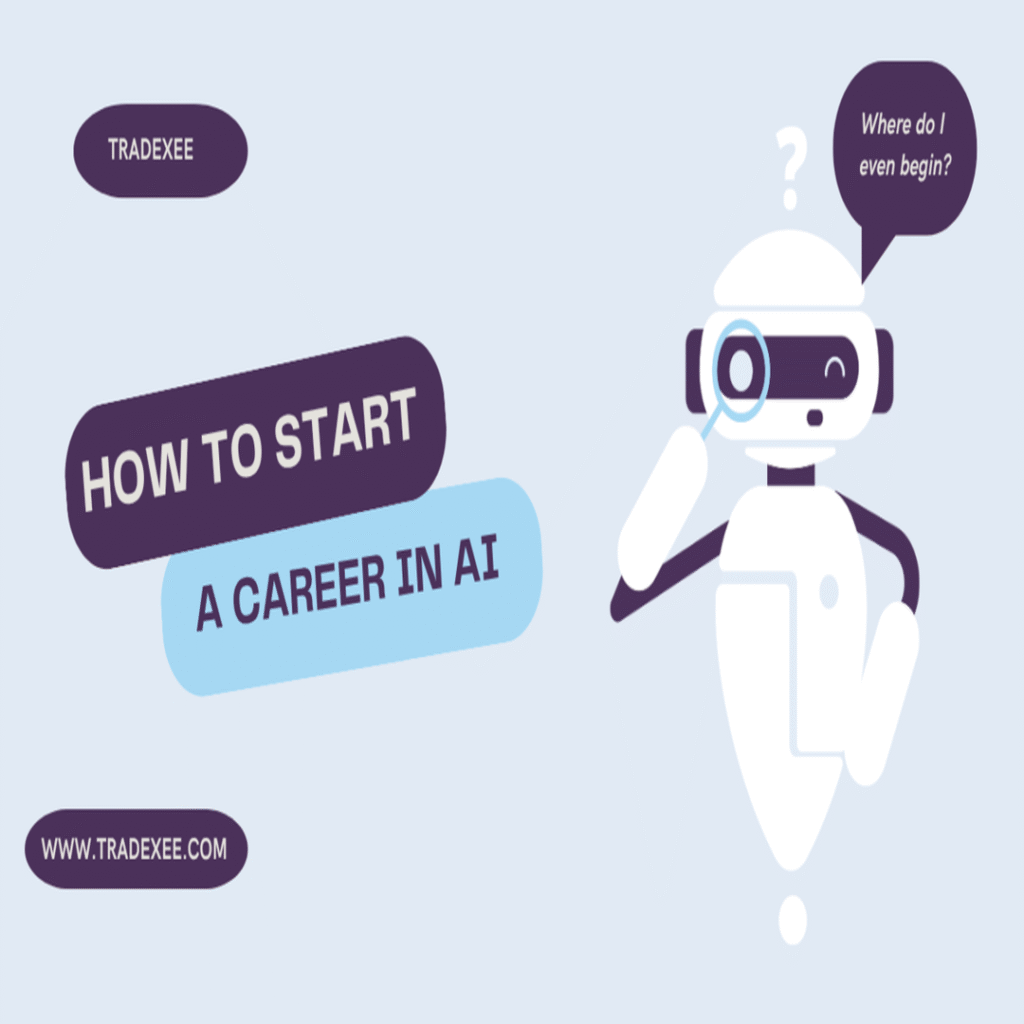Artificial Intelligence (AI) is no longer just a futuristic buzzword—it’s a booming field creating opportunities across industries. From healthcare and finance to marketing and gaming, AI is transforming how we live and work. If you’ve ever wondered how to start a career in AI, you’re not alone.
This guide breaks it down step-by-step: from building the right skills to finding your first job. Whether you’re a student, a career switcher, or just curious, this article is for you. If you’re ready to learn how to start a career in AI, keep reading.
Why AI Is the Future of Work
According to the World Economic Forum, AI is expected to displace 85 million jobs by 2025—but it will also create 97 million new ones. That means people who understand AI will be in high demand.
Even today, roles like AI Engineer, Data Scientist, Machine Learning Engineer, and AI Product Manager are some of the highest-paid positions in tech.
Real-life story: John, a former mechanical engineer, learned Python and machine learning through online courses during the pandemic. Within 18 months, he landed a job as a Junior AI Developer at a fintech company.
So, how did he do it? Let’s break it down and discover exactly how to start a career in AI from zero.
Step 1: Understand What AI Really Is
Before you dive in, understand what AI means:
What Is AI?
AI refers to machines designed to simulate human intelligence. This includes:
- Machine Learning (ML) – algorithms that learn from data.
- Natural Language Processing (NLP) – understanding and generating human language.
- Computer Vision – enabling machines to “see.”
- Robotics – machines that can act in the physical world.
LSI Keywords: machine learning, AI tools, deep learning, neural networks, AI applications
To truly understand AI, explore simple everyday applications—voice assistants, Netflix recommendations, spam filters. These aren’t magic—they’re machine learning models trained on massive data sets. Once you realize this, you’ll demystify AI and find it more approachable.
Learning how to start a career in AI begins with understanding the power of data, algorithms, and real-world problem solving. You don’t need to be a math genius, but being data-curious helps.
Step 2: Choose the Right Learning Path
There are multiple ways to start a career in AI, and your path depends on your background:
1. Formal Education
- Bachelor’s in Computer Science, Data Science, or AI
- Master’s in Machine Learning or AI
- PhDs for research-intensive roles
A degree isn’t the only way, but if you’re pursuing an academic path or aiming for a role in research or big tech companies, formal education can be very helpful.
2. Online Courses & Certifications
Platforms like:
These offer beginner-to-advanced courses on AI, Python, and TensorFlow.
Tip: You don’t need a CS degree to break into AI. Many employers value projects and portfolios more than diplomas.
3. Bootcamps
AI-focused bootcamps like Le Wagon and Springboard help fast-track your journey. They offer hands-on training and mentorship.
Example: A former teacher enrolled in Springboard’s AI program, completed a capstone project on sentiment analysis, and got hired as a data analyst at a health-tech startup within six months.
So, if you’re wondering how to start a career in AI without formal education, bootcamps and self-paced courses are your golden ticket.
Step 3: Master the Core Skills
To succeed, you must build a strong foundation in both technical and soft skills.
Technical Skills
- Python programming
- Statistics & Probability
- Linear Algebra & Calculus
- Machine Learning Algorithms
- Deep Learning (TensorFlow, PyTorch)
- SQL & Big Data Tools
Learning Python is often the first step. It’s beginner-friendly, versatile, and heavily used in AI workflows. Explore libraries like Pandas, NumPy, Scikit-learn, and Matplotlib.
Soft Skills
- Problem-solving
- Communication
- Critical thinking
Soft skills matter more than you think. AI isn’t just about coding—it’s about interpreting results, working in teams, and communicating insights to non-technical stakeholders.
Pro Insight: According to LinkedIn’s Emerging Jobs Report, AI specialists are one of the top roles, but most jobs require strong communication and teamwork skills too.
If you’re exploring how to start a career in AI from a non-tech background, focus heavily on mastering these soft skills alongside your tech toolkit.
Step 4: Work on Real Projects
Knowing theory is great, but real-world projects will make you stand out.
Project Ideas
- Predict house prices using machine learning
- Build a chatbot using NLP
- Create a recommendation system
- Use computer vision to detect objects in images
- Create a sentiment analysis tool for Twitter posts
Upload your work on GitHub and showcase it on LinkedIn.
Pro Tip: Contribute to open-source AI projects on GitHub. It shows initiative and helps you learn from experienced developers.
Internships
Apply for internships—even unpaid ones. They give you experience, mentorship, and networking opportunities. Websites like AngelList and Internshala often list opportunities in startups where you can wear multiple hats and learn quickly.
If you’re wondering how to start a career in AI without experience, internships and hands-on projects are your entry points.
Step 5: Build Your AI Portfolio
Think of your portfolio as your personal brand.
What to Include:
- GitHub repositories of projects
- Blog posts explaining your solutions
- Kaggle competitions you’ve participated in
- Certifications from online courses
- Dashboards or mini-apps you’ve built (try Streamlit)
This tells employers: “I don’t just know AI—I’ve built things with it.”
Bonus Tip: Use Medium or Hashnode to write articles about your learning process. It not only boosts your visibility but also reinforces your own understanding.
If someone Googles “how to start a career in AI,” they should find your portfolio as proof of someone who actually did it.
Step 6: Network Like a Pro
In the AI world, who you know is just as important as what you know.
How to Network in AI:
- Join AI communities on Reddit, Discord, or Slack.
- Attend AI conferences (like NeurIPS, ICML, or local meetups).
- Follow AI experts on LinkedIn and Twitter.
- Join forums like Kaggle and Towards Data Science.
Example: Many job seekers find AI internships and even full-time roles just by being active in Discord communities and sharing their progress.
Networking isn’t just about asking for jobs—it’s about exchanging ideas, getting feedback, and staying motivated.
Learning how to start a career in AI is easier when you surround yourself with people already doing it.
Step 7: Start Applying for Jobs
Look for entry-level roles like:
- Data Analyst
- Junior Machine Learning Engineer
- AI Research Assistant
- NLP Intern
Use job boards like:
How to Stand Out:
- Tailor your resume to each job
- Use keywords from the job description
- Showcase projects with measurable outcomes
Also, prepare for technical interviews. Practice coding on LeetCode, HackerRank, or InterviewBit.
Understanding how to start a career in AI is only half the battle—executing with strategy is what makes the difference.
Step 8: Stay Updated
AI is evolving daily. Keep learning:
Stay Ahead With:
- Google’s AI Blog: https://ai.googleblog.com/
- DeepMind Research
- OpenAI updates (yes, like ChatGPT!)
- Follow newsletters like Import AI by Jack Clark
- Enroll in ongoing MOOCs that introduce new AI tools and trends
AI isn’t a destination; it’s a journey. Continuous learning is the key.
Mistakes to Avoid When Starting a Career in AI
- Trying to learn everything at once – Focus on one area at a time.
- Skipping math – A basic understanding of statistics and linear algebra is essential.
- Not building projects – Practical skills > theoretical knowledge.
- Ignoring soft skills – Communication is vital for team-based roles.
- Neglecting version control – Learning Git and GitHub is a must for collaboration.
- Chasing tools, not problems – Learn how to solve problems, not just how to use fancy libraries.
How Much Can You Earn in AI?
Here’s what you can expect, according to Glassdoor (2025 data):
| Role | Average Salary (USD) |
|---|---|
| AI Engineer | $130,000 |
| Machine Learning Engineer | $120,000 |
| Data Scientist | $110,000 |
| AI Product Manager | $140,000 |
| AI Researcher (PhD) | $150,000+ |
Salaries depend on your location, experience, and the company. Startups may offer equity, while established firms may have better benefits.
If you’re committed to learning how to start a career in AI, you’re looking at one of the most financially rewarding paths available today.
Recommended Resources
Blogs & Communities
YouTube Channels
- Sentdex
- 3Blue1Brown (for math concepts)
- Two Minute Papers
Books
- Hands-On Machine Learning with Scikit-Learn, Keras, and TensorFlow by Aurélien Géron
- Deep Learning by Ian Goodfellow
- AI Superpowers by Kai-Fu Lee (great for understanding AI trends in China vs USA)
Final Thoughts: Is AI Right for You?
If you’re someone who enjoys solving problems, learning constantly, and building futuristic solutions, AI might be your calling. The beauty of AI is that it welcomes people from all backgrounds—tech, healthcare, marketing, finance, and more.
And remember: you don’t need to be a genius or have a PhD to get started. You just need curiosity, consistency, and a roadmap.
So, if you’re still wondering how to start a career in AI—just start. One line of Python code, one blog post, one project at a time.
How long does it take to start a career in AI?
Depending on your pace and background, 6–18 months of focused learning and project-building can land you an entry-level AI job.
Do I need a degree to start a career in AI?
Not necessarily. Many AI professionals come from bootcamps and self-taught backgrounds. A strong portfolio can often replace a formal degree.
Which language should I learn first?
Start with Python—it’s beginner-friendly and widely used in AI development.
Is AI hard to learn?
AI can seem complex at first, but with consistent effort and the right guidance, it’s absolutely achievable.
What industries hire AI professionals?
From finance to entertainment, education to e-commerce, AI jobs span across every major sector. You can specialize based on your interests.
Ready to Start Your AI Journey?
Your future in AI begins now. Explore the right learning path, build hands-on projects, and join a global movement shaping the world.
Start here: https://tradexee.com — your go-to resource for AI, tech, and investing.
Still asking how to start a career in AI? You already have. By reading this article, you’re one step ahead.


